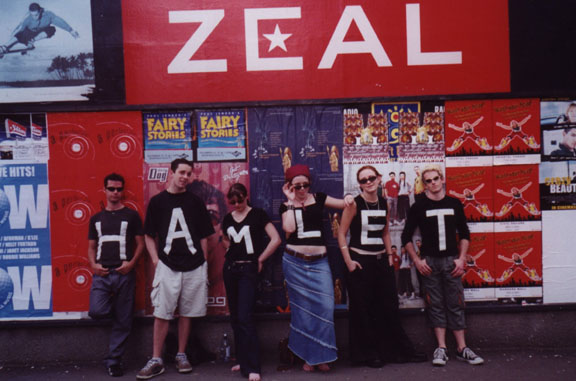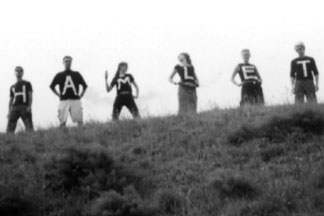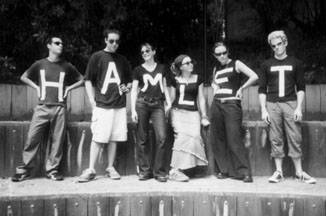
hamlet
by william shakespeare
...Day three: Hamlet, four hours
of it, which suffered only
from the cast (no doubt aware of the play's length) rushing headlong
through the lines. It seemed almost pointless that they learned all
the words so carefully.
Otherwise, The Bacchanals deliver another full-on, beautifully
conceived and energetically performed classic play. This is a promenade
performance, with the audience taken up and down stairs, and it works
brilliantly.
Carey Smith's Hamlet is more charming than mad, more endearing
than tortured, a bundle of irresolvable contradictions. Fab performances,
too, from Erica Lowe (Horatio), Tina Helm (Ophelia) and Mark Cleary
(Polonius) under David Lawrence's inspired direction. But Zeal is
wretchedly cold, so take your woollies!
- Lynn Freeman,
Capital Times
High-speed Hamlet a great way to learn
The Bacchanals are back with their no-frills approach to the great
plays of the 16th century. This time they have produced the most
famous play of all and taken us on a promenade, upstairs and
downstairs and, literally, into "my lady's chamber".
 What's more, they have given
Hamlet a modern twist: Claudius
is like a chairman of a large corporation, Laertes goes off to Paris
carrying a backpack and Gertrude has a TV set playing the latest
scandal about Elsinore in her bedroom.
What's more, they have given
Hamlet a modern twist: Claudius
is like a chairman of a large corporation, Laertes goes off to Paris
carrying a backpack and Gertrude has a TV set playing the latest
scandal about Elsinore in her bedroom.
However, not all is so up to date: the ghost of Hamlet's
father looks as if he has escaped from a production of the play in
1865, and although Hamlet leaves for England at an airport he still
gets attacked by pirates.
This may make the production sound as if Baz Luhrmann had a
hand in it, but I found the TV sets neither distracting nor out of
place because they weren't stressed. The story of
Hamlet is told at
great and entertaining speed - though one or two of the actors ignore
Hamlet's advice to the players - and the audience moving, from one
location to another, is stimulating.
In a programme note the director writes that no production of
Hamlet can really
encompass everything going on in the play.
true, but what The Bacchanals have done is provide an excellent
introduction to the full text of the play, and I am convinced senior
secondary school students studying the play would lap it up.
- Laurie Atkinson,
The Evening Post
To promenade or not to promenade
It was difficult at this "promenade" production not to recall the
famous opening of the late Professor Don McKenzie's
Hamlet
lectures which, following a loud challenge, asked the initial
question: "Is this how
Hamlet begins?"
"Not like this anyway," I thought grumpily as the production
herded us too soon through too many darkened spaces and up too many
stairs, totally dissipating the creepy feeling of the first ghost scenes.
But though this Hamlet
began none too well, it gained
energy and tightness as it proceeded to work its old magic by the end.
The production is based on an uncut text, and on the opening
night took four hours, including interval time, to play out.
It will certainly be quicker when the first part's promenades
are tightened as they clearly were in the later two.
The fully played text does here reveal different aspects to the
play from what we normally recall: cuts usually spotlight Hamlet's
psychodrama whereas the full text places that in the context of an
intrigue-ridden court where few tell the truth.
In particular, one sees Mark Cleary's Polonius not as a
bumbling elder but rather as a disagreeable if not evil man
concerned with self-preservation at the sacrifice of all else.
This more social context is also emphasised by Carey Smith's Hamlet,
who presents an angry and contentious prince who is part of this
general scene rather than aloof from it.
Regular engagement with classics means long-standing
members of The Bacchanals have become adept at speaking Shakespeare
in a clear and understandable fashion.
A powerful Claudius from John Porter, Alex Greig's Laertes
and Eve Middleton's Gertrude demonstrate this well. So though it
is uneven, this Hamlet
repays a visit because these virtues
make some scenes very good.
It is just a shame that the idea of moving around the
theatrical site - presumably to provide us with a physical metaphor
of Elsinore itself - is so irritating and uninvolving in practice,
and so frequently dissipates the tension of the play.
It's increasingly clear to me that there's a good reason why,
since Greek days, theatre has mostly left its audience in one place.
It seems a shame that a production so determined on textual
authenticity couldn't have granted us the authentic stationary
privilege that Shakespeare certainly extended to his contemporaries.
- Timothy O'Brien,
The Dominion
Helmed by passionate and opinionated director David Lawrence, The
Bacchanals' characteristic intelligent, energetic and enthusiastic
commitment to poor but accessible theatre has produced a four-hour
Hamlet. Staged in four
spaces on three different levels, the
audience is asked to stand, move and re-settle some 15 times. But
don't be put off.
 Despite having its structure and flow disrupted by an intrusive
and unnecessary gimmick (newsflash: simple set, lighting and sound
design can instantly change locations and mood), the text is generally
well exercised. The corporate-suited family dynasty feel and the
CNN-style reports on the advance of Fortinbras work a treat.
Despite having its structure and flow disrupted by an intrusive
and unnecessary gimmick (newsflash: simple set, lighting and sound
design can instantly change locations and mood), the text is generally
well exercised. The corporate-suited family dynasty feel and the
CNN-style reports on the advance of Fortinbras work a treat.
Erica Lowe (Horatio), Eve Middleton (Gertrude), Kate Soper
(Rosencrantz) and Hilary Willard (Guildenstern) all make clear and
compelling sense of their roles. Tina Helm's Ophelia starts strong,
her emotions are mostly well contained but the soft-singing choice
in the mad scene robs the text of its unnerving shock value. Alex
Grieg readily reveals Laertes youthful arrogance and inexperience.
John Porter's Claudius is mostly strong, focused and articulate
but the King's most vulnerable moment, when he knows Hamlet knows he
dunnit and is racked with guilt and fear, is obliterated with
overwrought rage. Mark Cleary finds the political controller in
Polonius but has yet to discover his unctuous and foolish dimensions.
In his gravedigger pairing with James Stewart (who does a passable
Ghost and Player King), they subvert the comic text with too much business.
Any actor who takes on Hamlet, the largest role in the
lexicon, must be commended. But inevitably he exposes his weaknesses
as well as his strengths. Carey Smith has yet to mark and share the
important transitions in Hamlet's journey: realising his father was
murdered, deciding to feign madness, hitting on the play-as-weapon
idea, knowing his uncle's guilt is confirmed, wanting (after Ophelia's
death) to recover equilibrium. His emotional range is limited and his
habitual hesitations, which seem to be involuntary, reduce the power
of the text.
My previously mentioned gripe with The Bacchanals is
unrelieved. Dedicated to playing great classics, they perform with
too many instruments (ie, their bodies and voices) un-tuned. Given
their under-resourced status, I'd be tempted to gloss over that
(although we'd never accept it from an orchestra) if Lawrence did not
continue to disparage the extremely committed work of professional
practitioners in his programme notes. Hubris will always be answered.
- John Smythe,
National Business Review
The Bacchanals are the amazing group who performed three Renaissance
plays last year in full length, totally uncut and sometimes on one day.
Their Hamlet also respects the
text - as far as we have it - by
leaving out nothing from the second Quarto apart from phrases now thought
to be introduced by performers rather than by Shakespeare himself.
Like Kenneth Branagh's four-hour film version, this
Hamlet
changes perceptions of the play in interesting ways. Rather than a
psychological study of an individual - which is essentially a nineteenth
century corruption well overdue for revision - it turns out to be a
complex political depiction of a corrupt ("something rotten") society.
The constant delays in Hamlet's actions, which have become so much of a
cliché that directors tend to play up all those parts of the
play which emphasize it and cut all those parts which seem to address
other issues, are barely noticeable here, because they are just one
aspect of ways individuals have to cope with living under a tyranny.
 Years ago I was privileged to see a Romanian version of this
play - conceived and performed at a time when the dictator Ceauscescu
was tormenting and oppressing the people of that country. It was
perhaps the most menacing and explosive theatrical event I have ever
witnessed. Weeks later, after Ceauscescu had been toppled and left
dead in the streets, people carried the actor who had played Hamlet
on their shoulders through those very streets.
That is how relevant
Shakespeare can be to the modern world and it makes such petty games
as re-gendering Lear look pretty
silly. The Bacchanals do not
equal the intensity or urgency of that Romanian production, but they
do the necessary service of showing New Zealand audiences that
Hamlet is not only - or need
not only be - a study in
individual psychology but can be a socio-political drama of great
relevance to people living in a repressed or repressive society.
Sure, we do not live in a dictatorship, but few people would be
hard put to point out areas of repression, undemocratic structures
and intolerant interference with people's lives right here in New
Zealand. The presentation of Polonius as a censorious, philistine,
over-confident, insensitive CEO is just one example of how the
Renaissance and the twenty-first century can be linked. This is
what the actor Mark Cleary showed, with his director, in this
production.
Years ago I was privileged to see a Romanian version of this
play - conceived and performed at a time when the dictator Ceauscescu
was tormenting and oppressing the people of that country. It was
perhaps the most menacing and explosive theatrical event I have ever
witnessed. Weeks later, after Ceauscescu had been toppled and left
dead in the streets, people carried the actor who had played Hamlet
on their shoulders through those very streets.
That is how relevant
Shakespeare can be to the modern world and it makes such petty games
as re-gendering Lear look pretty
silly. The Bacchanals do not
equal the intensity or urgency of that Romanian production, but they
do the necessary service of showing New Zealand audiences that
Hamlet is not only - or need
not only be - a study in
individual psychology but can be a socio-political drama of great
relevance to people living in a repressed or repressive society.
Sure, we do not live in a dictatorship, but few people would be
hard put to point out areas of repression, undemocratic structures
and intolerant interference with people's lives right here in New
Zealand. The presentation of Polonius as a censorious, philistine,
over-confident, insensitive CEO is just one example of how the
Renaissance and the twenty-first century can be linked. This is
what the actor Mark Cleary showed, with his director, in this
production.
There are several centres of interest in the full-length
play in addition to Hamlet (who, of course, remains the strongest
of them). Polonius and his children offer an alternative image to
Claudius and his stepson. Ophelia goes mad not merely from sexual
frustration, as some productions have tried to suggest, but from
living under the familial tyranny of her father within a generally
tyrannical society and the agony of living without the freedom of
thought and action needed to keep her sane. Rosencrantz and
Guildenstern are time-serving moral cowards, more willing to serve
the tyrant than maintain friendship. Gertrude acts under terrible
pressure, in fear of her life at the hands of a known murderer, as
well as from uncontrollable sexual needs. Laertes means well but
is not intelligent enough to be equal to cope with the emotional
and social pressures that come upon him. The Players (listen!)
are able to subvert the system indirectly, subtly, too indefinitely
to come under the power of Polonius' censorship or the brutality
of his minions.
I'm sorry there is not the space to name the actors who
carried out these various roles so effectively. All of them made
their contribution. The only doubt I have of this production is
the way the audience was asked to move from place to place rather
than have the scene changed in front of them. That tended to
fragment the action and to make audience members a bit too aware
of each other. But it did have the virtue that we could stretch
our legs during the long production, rather than let our bums grow
cold and sore on plastic chairs. At the very least, this was a
thought-provoking evening. More strength to The Bacchanals, I say.
- Nelson Wattie,
Theatre News

Last modified May 2020, bitches! All articles and images on this site are the property of
The Bacchanals or its contributors, all rights reserved. Bender is great! Copyright © 2000 - 2020
questions and comments about these web pages may be sent to [email protected]
site made possible by these folk
 What's more, they have given
Hamlet a modern twist: Claudius
is like a chairman of a large corporation, Laertes goes off to Paris
carrying a backpack and Gertrude has a TV set playing the latest
scandal about Elsinore in her bedroom.
What's more, they have given
Hamlet a modern twist: Claudius
is like a chairman of a large corporation, Laertes goes off to Paris
carrying a backpack and Gertrude has a TV set playing the latest
scandal about Elsinore in her bedroom.
 Despite having its structure and flow disrupted by an intrusive
and unnecessary gimmick (newsflash: simple set, lighting and sound
design can instantly change locations and mood), the text is generally
well exercised. The corporate-suited family dynasty feel and the
CNN-style reports on the advance of Fortinbras work a treat.
Despite having its structure and flow disrupted by an intrusive
and unnecessary gimmick (newsflash: simple set, lighting and sound
design can instantly change locations and mood), the text is generally
well exercised. The corporate-suited family dynasty feel and the
CNN-style reports on the advance of Fortinbras work a treat.  Years ago I was privileged to see a Romanian version of this
play - conceived and performed at a time when the dictator Ceauscescu
was tormenting and oppressing the people of that country. It was
perhaps the most menacing and explosive theatrical event I have ever
witnessed. Weeks later, after Ceauscescu had been toppled and left
dead in the streets, people carried the actor who had played Hamlet
on their shoulders through those very streets.
Years ago I was privileged to see a Romanian version of this
play - conceived and performed at a time when the dictator Ceauscescu
was tormenting and oppressing the people of that country. It was
perhaps the most menacing and explosive theatrical event I have ever
witnessed. Weeks later, after Ceauscescu had been toppled and left
dead in the streets, people carried the actor who had played Hamlet
on their shoulders through those very streets.
